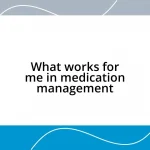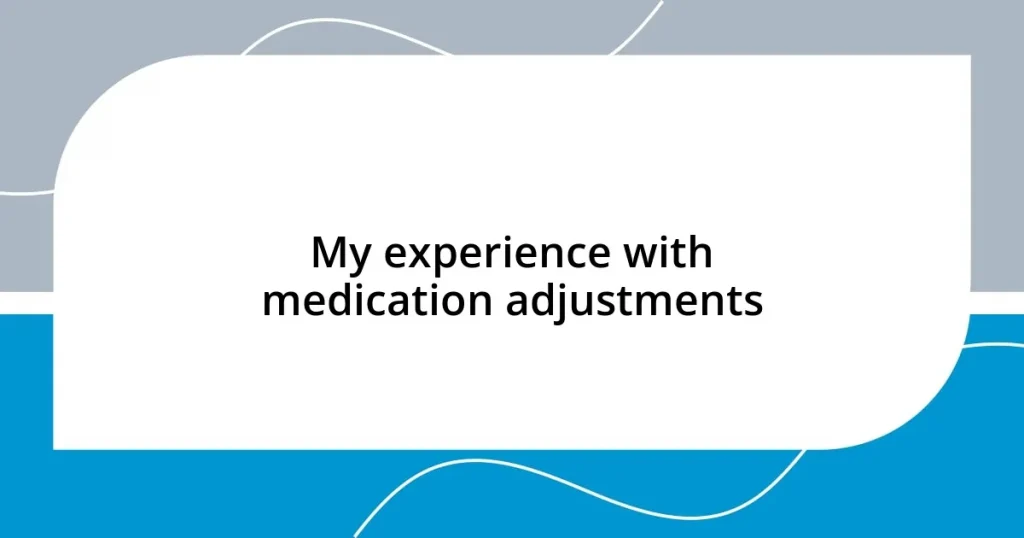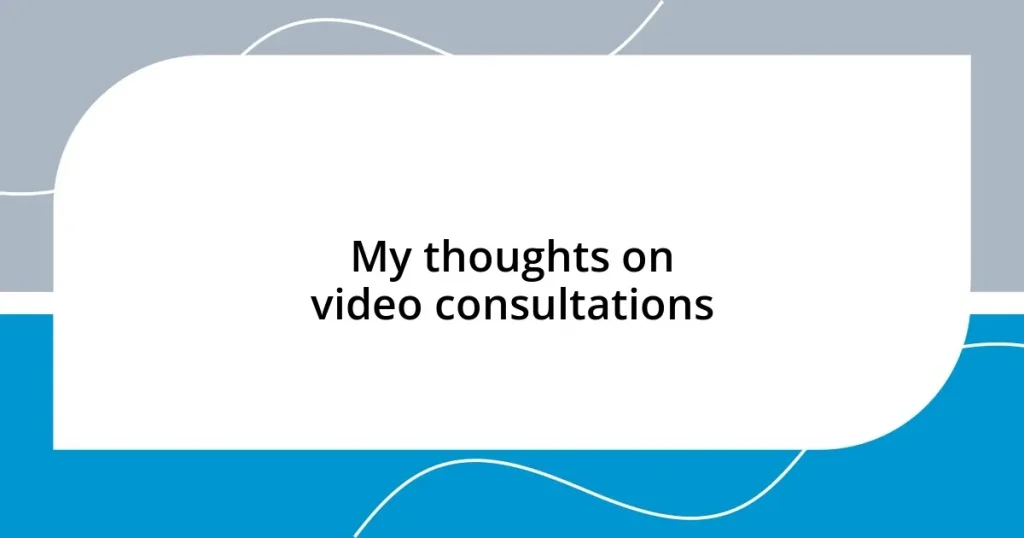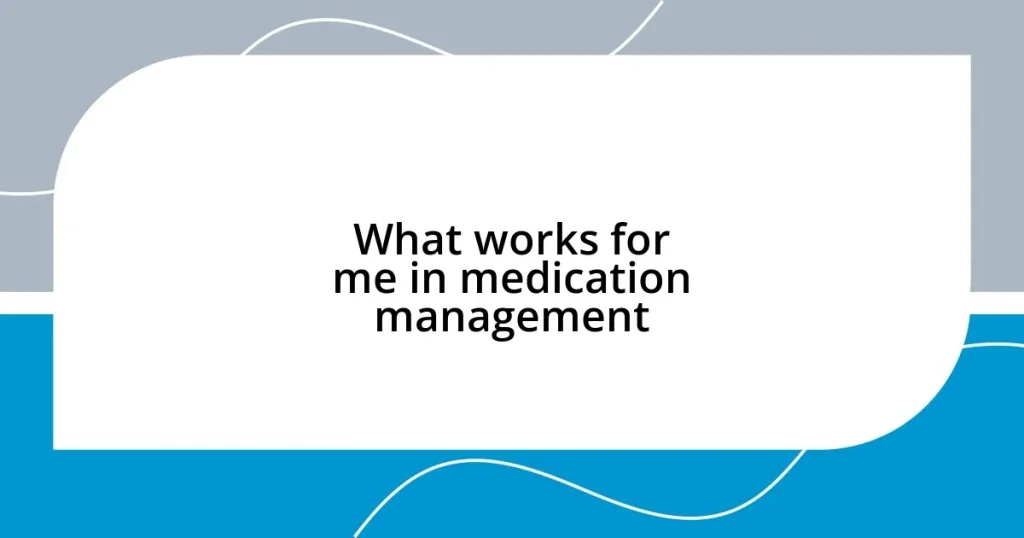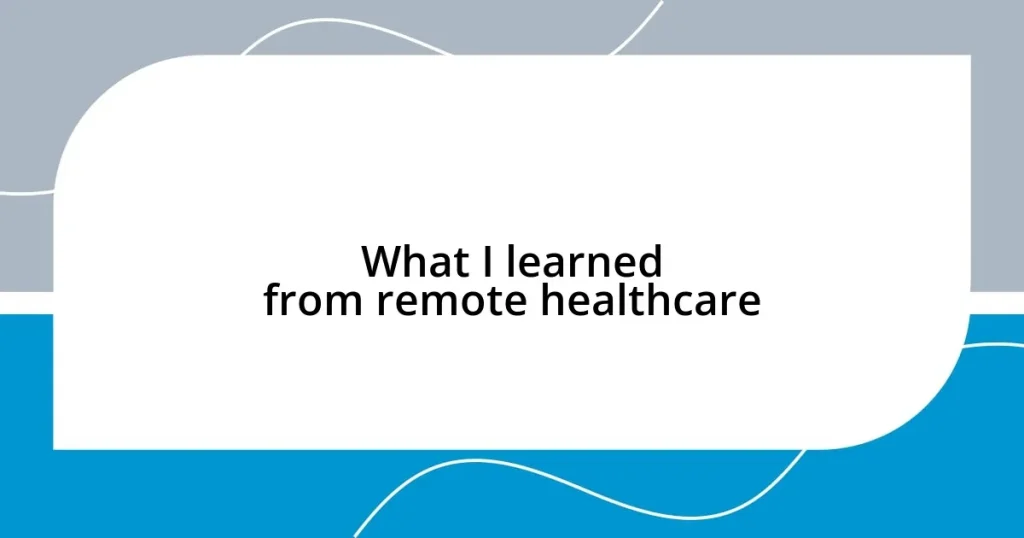Key takeaways:
- Medication adjustments can evoke a mix of emotions, necessitating open communication with healthcare providers for effective management.
- Common reasons for adjustments include ineffectiveness, side effects, changes in health, and lifestyle shifts.
- Monitoring personal experiences through journaling and regular check-ins can foster a sense of control and enhance participation in treatment.
- Seeking professional guidance plays a critical role in navigating the uncertainties and challenges of medication changes.
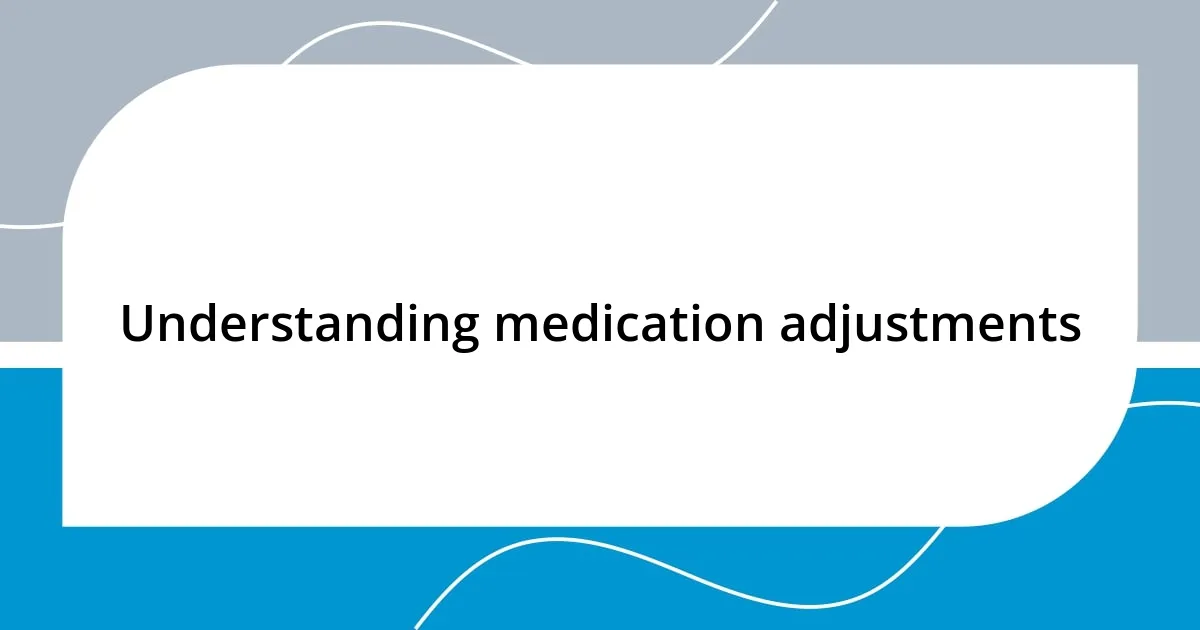
Understanding medication adjustments
Medication adjustments can sometimes feel overwhelming. I remember when my doctor suggested a change to my dosage; it was almost like a rollercoaster ride. I felt anxious yet hopeful, wondering how these adjustments would impact my daily life and overall health.
There are times when the benefits of a medication don’t manifest as expected. In my case, when I first started adjusting my anxiety medication, I experienced a whirlwind of emotions—sometimes too high and other times, too low. Adjustments often require patience and vigilance, don’t they? It’s crucial to be open to watching for any changes, both positive and negative.
I’ve learned that communication with healthcare providers is essential during this process. When I faced a setback, I made it a priority to share my experiences, and it felt empowering to have an active role in my treatment. Have you ever voiced your concerns only to be met with understanding? That kind of support can make all the difference.
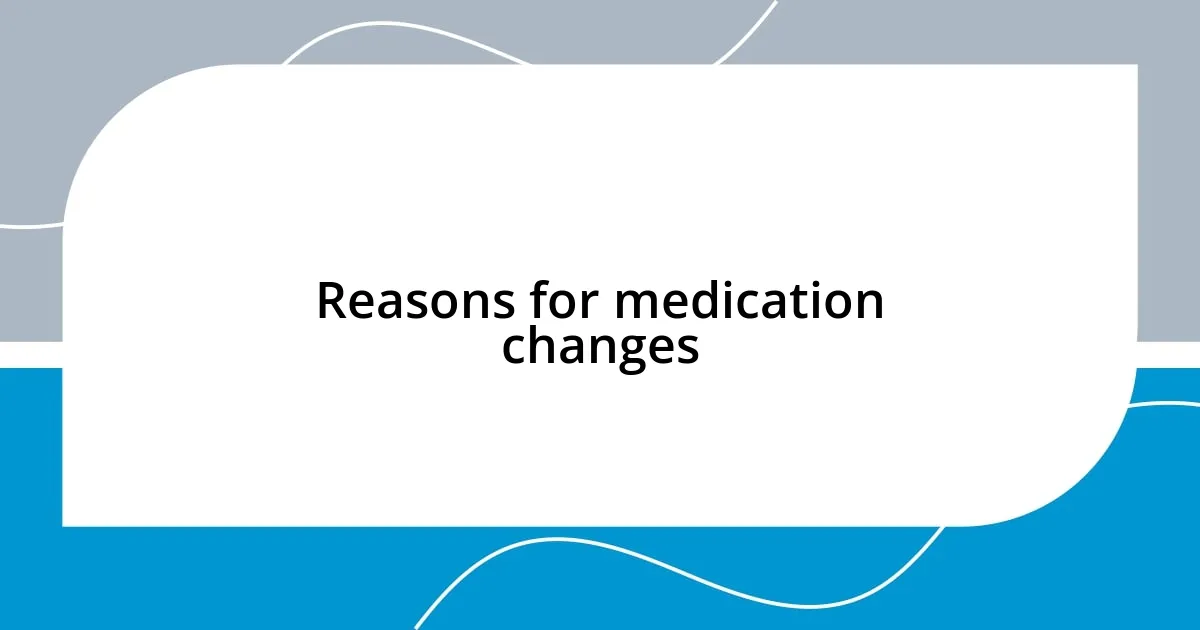
Reasons for medication changes
Sometimes, medication changes are necessary due to side effects that disrupt daily life. I recall adjusting an antidepressant once because the dizziness it caused interfered with my routine. The struggle between feeling better mentally and managing annoying physical symptoms is something many can relate to.
Here are some common reasons why medication adjustments may occur:
- Ineffectiveness: When the medication doesn’t provide the expected relief.
- Side Effects: Experiencing adverse reactions that compromise quality of life.
- Changes in Health: New medical conditions or changes in existing ones can necessitate a review.
- Tolerability Issues: Over time, the body may adjust to certain medications, reducing their effectiveness.
- Lifestyle Changes: Shifts in activity, diet, or stress levels may warrant a re-evaluation of dosages.
Each of these reasons can evoke a mix of frustration and hope, as I’ve often found myself hopeful that the next adjustment will be the one to finally stabilize my condition. There’s something about knowing that your treatment plan isn’t set in stone that can be both reassuring and nerve-wracking. Adjustments, while challenging, can symbolize a step toward feeling better, and that hope is truly powerful.
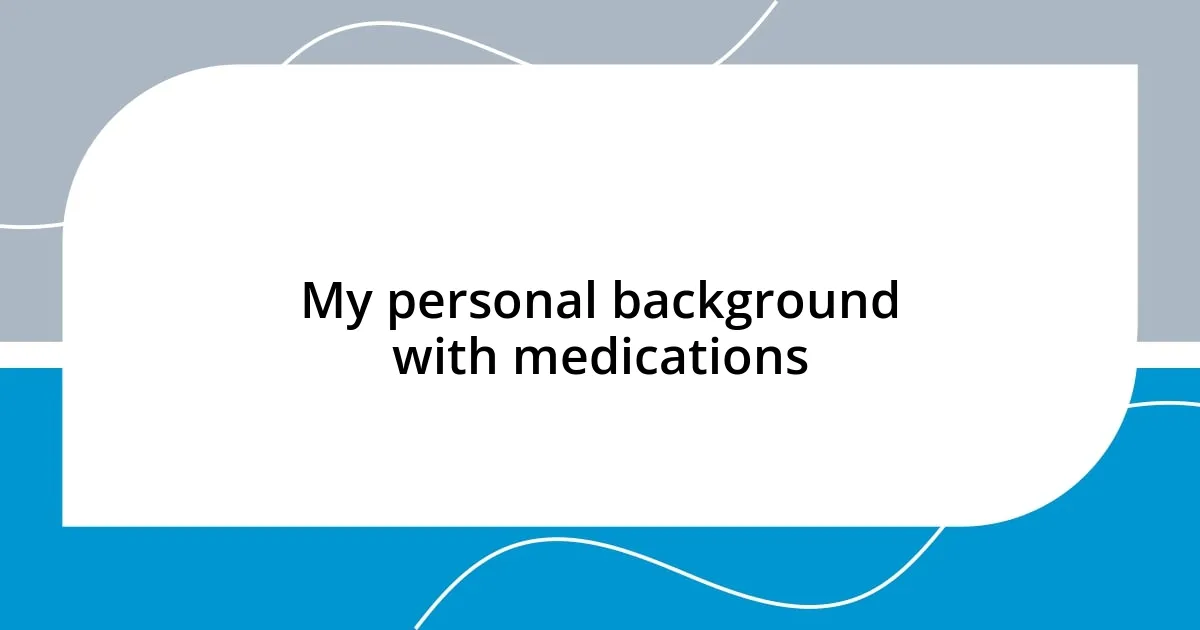
My personal background with medications
I’ve been on medication for a while now, and my journey has been quite the adventure. I remember starting my first prescription—it felt like stepping into uncharted territory. Initially, I was excited, thinking this would be the solution to my struggles. But as I went through adjustments, I realized it was more nuanced. Each change brought about new challenges, taking time to adjust to the effects on my mood and energy levels.
The first time my doctor suggested switching medications, my heart raced. I had just begun to understand one medication, and now I was faced with the idea of something entirely new. It wasn’t just about the pills; it was about hope and fear intertwined. I often reflected on whether this next step would lead to better days or more hurdles. That moment of uncertainty is something many face—have you felt that same tension when contemplating a change in your routine?
Through the ups and downs, I’ve garnered invaluable insights. I learned to keep a journal to track my moods, which gave me a clearer picture to share with my healthcare provider. This practice fostered a sense of control; I felt like an active participant rather than a passive observer in my treatment. Being proactive helped me voice my feelings and concerns more confidently. Have you taken steps to document your experiences? I found that small actions can impact your journey more than you realize.
| Medication Decision | Emotion |
|---|---|
| First Medication Start | Excitement |
| First Adjustment Suggested | Fear |
| Active Participation | Empowered |
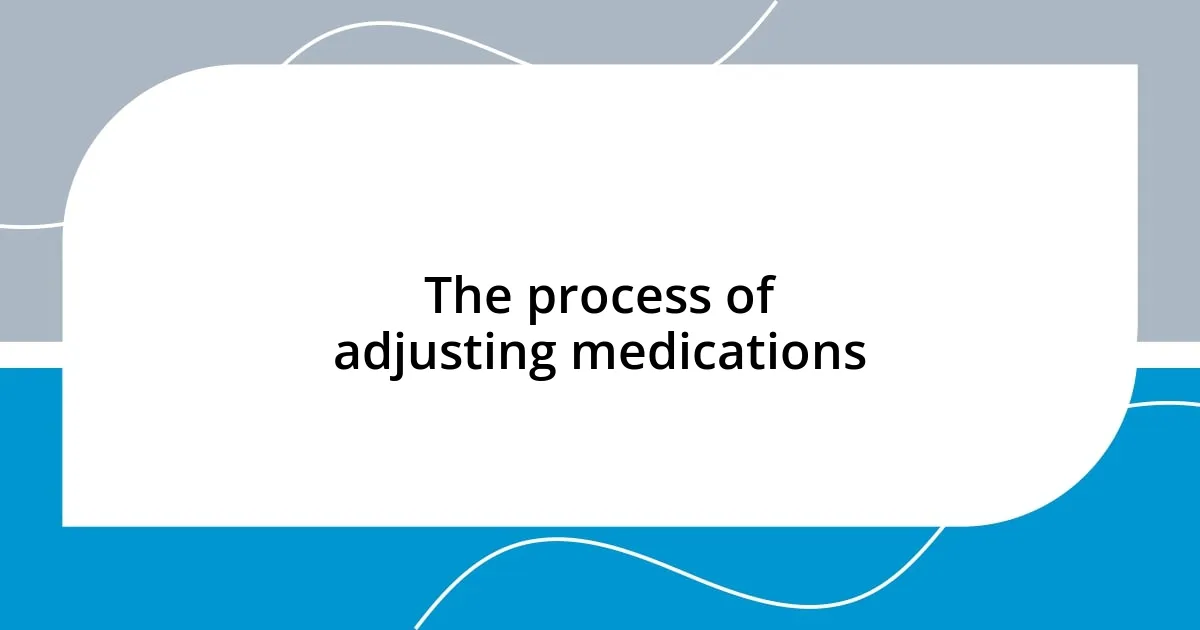
The process of adjusting medications
When it comes to adjusting medications, the process can feel both overwhelming and enlightening. I remember sitting down with my doctor, armed with my mood journal, eager yet anxious about what changes lay ahead. It was clear to me that each adjustment wasn’t just a medical decision; it was a pivotal moment that could profoundly affect my daily life. Have you ever felt that tight mix of anticipation and dread when discussing potential changes in your regimen?
One of the most surprising facets of the adjustment process for me was realizing how attuned I had to become to my body. I had to pay close attention to subtle shifts. For example, after switching from one antidepressant to another, I experienced a surge of energy that initially felt exhilarating, but I quickly learned it also came with bouts of anxiety. It’s a delicate balance, isn’t it? Finding that sweet spot where the benefits outweigh the drawbacks requires both patience and vigilance.
I discovered that good communication with my healthcare provider is essential. When I shared my experiences candidly, we were able to navigate adjustments more effectively. I learned to ask specific questions, like, “What should I expect in the first few weeks of this new medication?” or “How will we know if it’s working?” This proactive approach made me feel invested in my treatment, transforming the uncertainty of medication adjustments into a collaborative journey. How do you approach these conversations with your healthcare team?
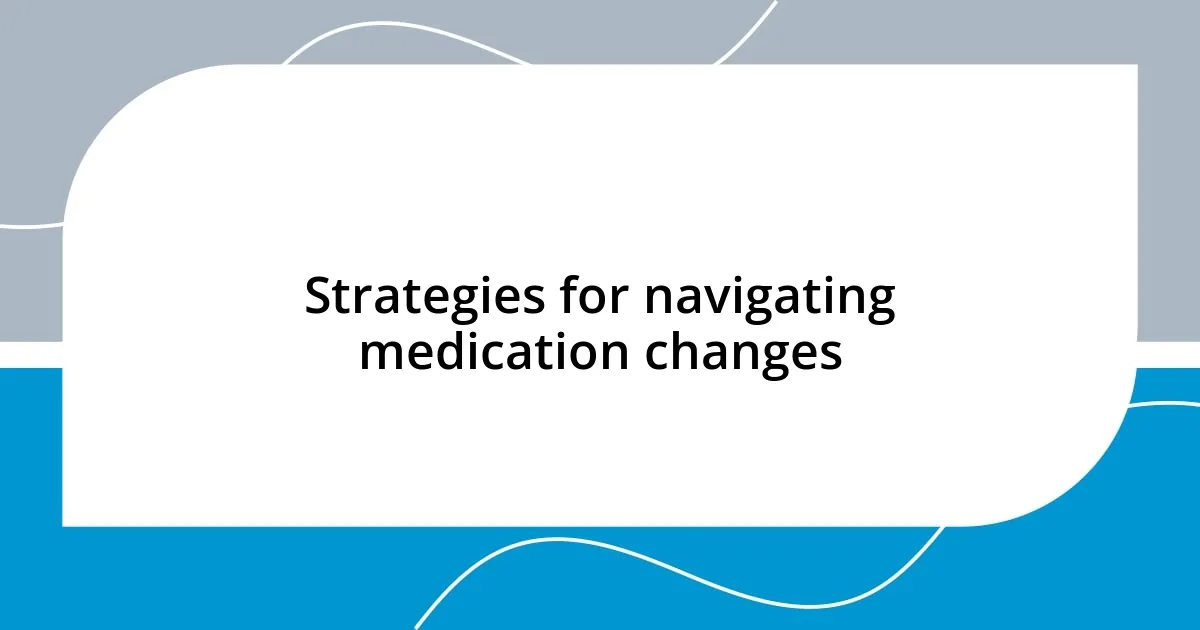
Strategies for navigating medication changes
Navigating medication changes can be daunting, but I found that preparation was key. Before making a switch, I took the time to research potential side effects and benefits. This way, I wasn’t venturing into the unknown—I was arming myself with knowledge. Have you ever experienced the relief that comes from feeling informed? It transformed my anxiety about changes into a more manageable sense of curiosity.
In my experience, creating a support system has also been invaluable. I made it a point to discuss my medication adjustments with trusted friends who had similar experiences. We exchanged stories, which provided different perspectives and reassured me that I wasn’t alone. It’s amazing how sharing our fears and wins can lighten the emotional load, isn’t it? Having someone to vent to can make all the difference.
I also learned to embrace flexibility during adjustments. Initially, I clung to a rigid routine, but I quickly realized that my body might need time to adapt. Now, instead of resisting the unpredictable swings in my mood or energy, I give myself grace. I treat those fluctuations as part of the journey, much like a wave that rises and falls. Have you allowed space for fluctuations in your own routine? Adapting my mindset in this way fostered resilience, making the process much more bearable.
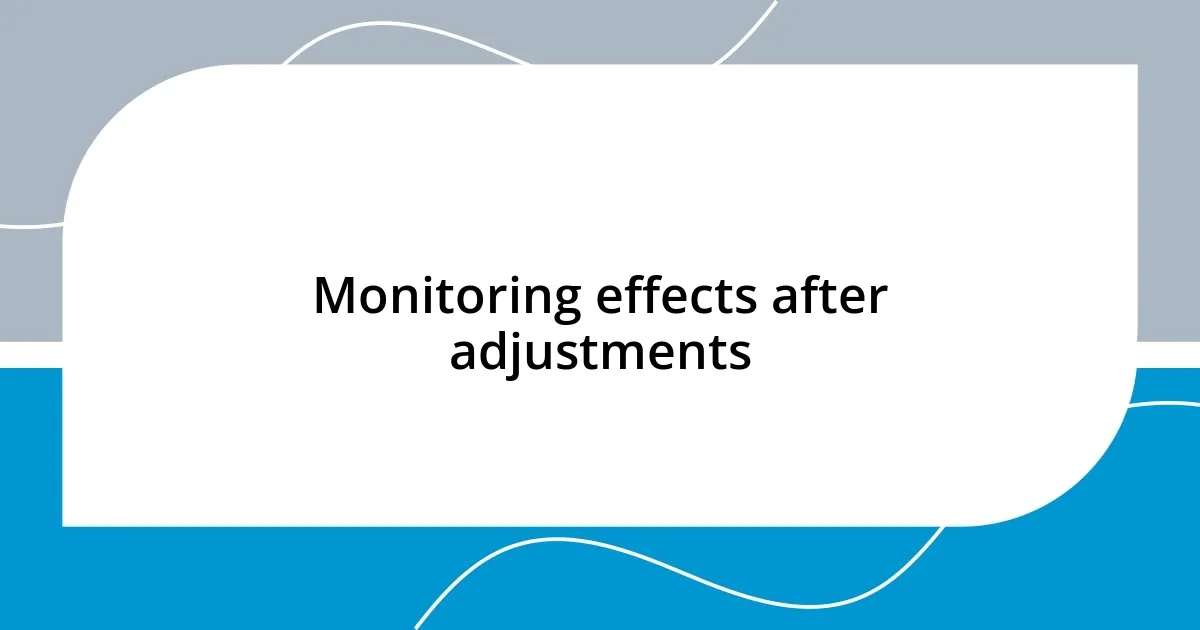
Monitoring effects after adjustments
Monitoring the effects of medication adjustments is a crucial step that I learned to approach with an open mind. After one particular change, I dedicated time each day to journal my feelings and experiences. It wasn’t just about noting the good or the bad; it was about capturing the nuances in between. Do you ever realize how much you can uncover by simply putting pen to paper?
I found that specific checkpoints worked wonders for assessing my progress. For instance, I scheduled weekly check-ins with myself, where I could reflect on my mood, energy levels, and any unexpected side effects. I vividly recall one week where despite feeling anxious, I noticed an overall clarity in my thoughts. It was through these moments that I began to appreciate the importance of mindfulness while navigating the adjustment period. How often do we pause to evaluate our emotional landscape during such transitions?
Ultimately, sharing my observations with my healthcare provider turned out to be invaluable. I remember discussing a spike in restlessness I experienced after a dosage change. My doctor suggested simple strategies like breathing exercises and offered reassurance that these feelings might level out over time. This dialogue reinforced my belief that active participation in my treatment not only fostered understanding but also built a sense of partnership in my care. Do you think engaging openly with your provider can lead to more tailored support?
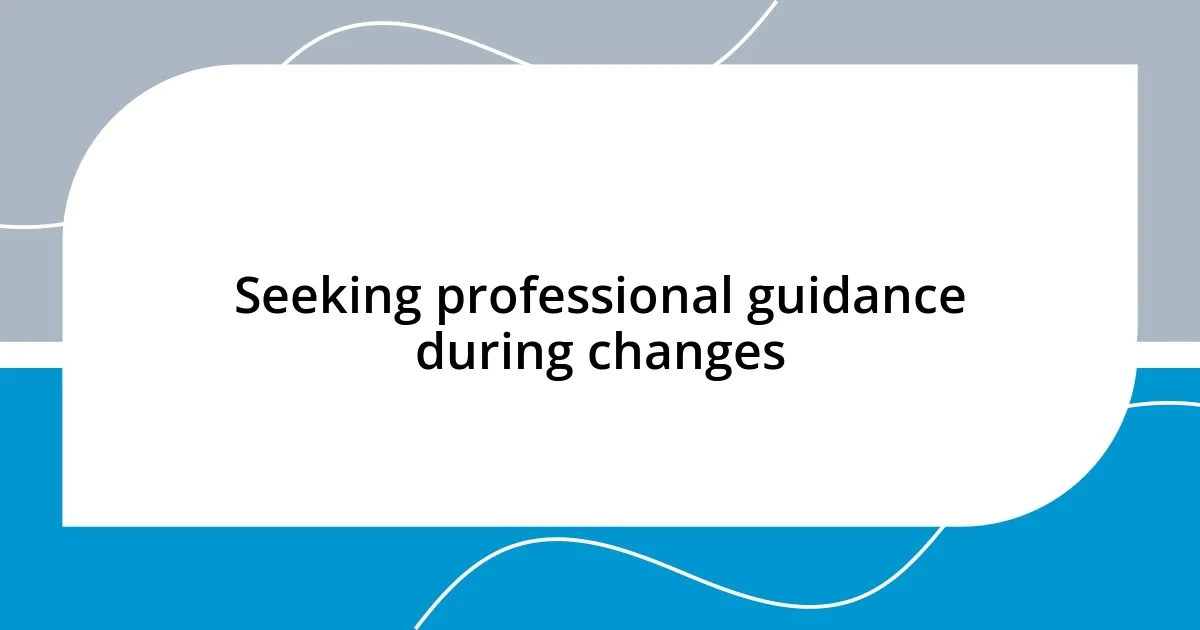
Seeking professional guidance during changes
When I made medication changes, seeking professional guidance was essential. I remember feeling a bit overwhelmed about adjusting my dosage and the myriad of possibilities that came along with it. So, I decided to book an appointment with my doctor. That conversation became a turning point; I shared my worries, and in return, I received not just clinical advice but also empathy. Isn’t it comforting to feel understood during such uncertain times?
Having a healthcare provider to turn to also gave me a safe space to express my feelings. I recall one instance when I had a frustrating episode of insomnia after a change in my prescription. Instead of simply trying to self-manage, I reached out for help. My doctor offered practical solutions tailored to my lifestyle, reminding me that my experiences mattered. This left me reflecting: how often do we underestimate the power of professional support when facing mental health challenges?
I learned that regular check-ins with my provider were instrumental, especially as my body adjusted to the new medication. After a few weeks, I made it a habit to discuss my symptoms and progress during follow-up appointments. One day, I recalled how much more alert I’d been feeling compared to before the adjustment. It surprised me how these little victories could mean so much when shared with someone who truly cared. Have you considered the impact of these small moments in your own journey?


